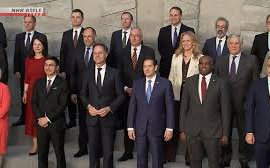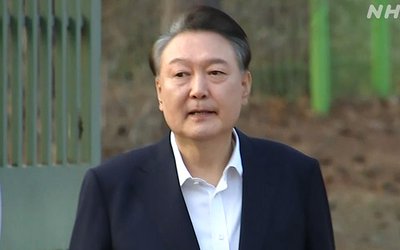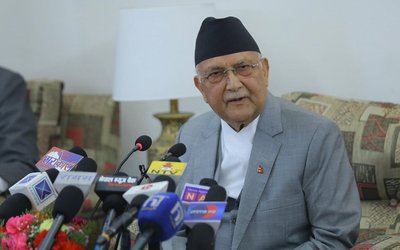
Theresa May hopes to bring her Brexit deal back to parliament again next week after it was rejected for a third time by MPs – and appears poised to trigger a general election if parliament fails to agree a way forward.
May hints at possible need for election, saying MPs 'reaching limits' of Brexit process - as it happened
Despite the embattled prime minister’s dramatic promise on Wednesday that she would hand over the keys to 10 Downing Street if her Tory colleagues backed the withdrawal agreement, parliament voted against it on Friday, by 344 to 286.
The Commons vote was held on the day when Britain was meant to be leaving the European Union, as Parliament Square outside overflowed with raucous pro-Brexit protesters.
A string of leave-supporting Conservative backbenchers who had twice rejected the deal, including Boris Johnson, Jacob Rees-Mogg and former Brexit secretary Dominic Raab, switched sides to support the agreement. But with Labour unwilling to shift its position, and the Democratic Unionist party’s 10 MPs implacably opposed, it was not enough to secure a majority for May.
The result was a sense of stunned disbelief in Westminster. Asked what could happen next, one government source said: “Last one out, turn off the lights.”
Immediately after the defeat was announced, May told MPs: “The implications of the house’s decision are grave. The legal default now is that the United Kingdom is due to leave the European Union on 12 April. In just 14 days’ time.”
Under the deal agreed by EU leaders in Brussels last week, if May had passed her withdrawal agreement this week, Brexit would have been delayed until 22 May. Now, she will have to return to Brussels for an emergency European council summit on 10 April.
The EU27 expect her to ask for a longer delay – requiring Britain to participate in the European elections in May – or accept a no-deal Brexit two days later. However, her aides hope the 22 May date could still be in play if her deal is accepted next week.
May did not spell out explicitly what she planned to do next, saying only that she would press ahead with an “orderly Brexit”. However, it became increasingly clear after the vote that Downing Street does not believe the deal is dead.
The prime minister pointed to MPs’ plans to hold a second round of indicative votes on Monday, “to see if there is a stable majority for a particular alternative version of our future relationship with the EU.”.
Courtesy: The Guardian
- India Supported Construction Of Four Schools In Nuwakot
- Mar 19, 2021
- Nepal Denies Permission For Third Phase Trial Of Vaccine Against COVID-19
- Aug 31, 2020
- Messi Can Only Cancel Barcelona Contract If €700 Million Release Clause Is Paid, La Liga Confirms
- Aug 31, 2020
- India To Carry Out Study On Kathmandu-Raksaul Railway
- Aug 28, 2020
- COVID-19: 1,351 Personal Of Nepal Police Infected
- Aug 28, 2020















